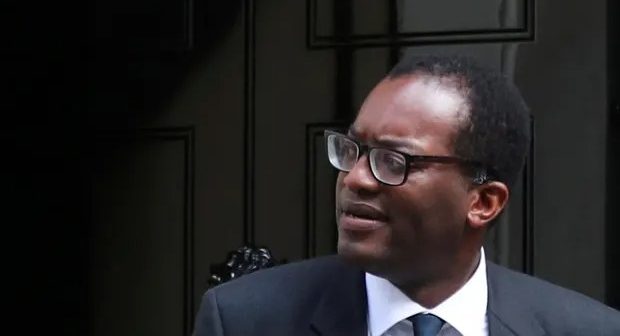Fresh Cabinet tensions surfaced over the £12billion national insurance hike today as Liz Truss insisted it will go ahead – despite claims Kwasi Kwarteng wants it dropped.
The Foreign Secretary said the ‘decision has been made’ on the increase – intended to fund the NHS and social care reforms – and ministers were ‘all behind that’.
The comments came amid renewed pressure for the Chancellor to think again to ease the cost of living crisis as inflation and energy bills soar.
Borrowing figures released yesterday showed Mr Sunak has some headroom, but he cautioned that interest payments on the government’s £2trillion debt mountain had hit a record high in December.
Meanwhile, Health Secretary Sajid Javid said the funding for the NHS catch-up after Covid and social care were ‘secure’.
In a round of interviews this morning, Ms Truss said: ‘Cabinet has made the decision to proceed with the National Insurance increase and we’re all behind that, and there are no plans to change that.’
Asked on Sky News if it was something that would be reconsidered, she said: ‘No.’
She later told LBC: ‘The decision has been made on National Insurance, that was a collective decision and it’s going ahead.’
According to the Telegraph, Mr Kwarteng has privately voiced concerns to Mr Sunak about going ahead with the NI rise.
NI contributions for employers and employees are due to rise by 1.25 percentage points in April.
It will cost someone on a £30,000 salary around £255 a year, while someone earning £50,000 will lose around £505 from their-take home pay.
Senior figures including Lord Frost, the Prime Minister’s former Brexit chief, have already insisted that the £12billion tax grab is not needed.
The Government borrowed £16.8billion last month – roughly in line with forecasts but some £7.6billion less than in December 2021.
Borrowing for the whole of the 2021-22 financial year is on course to hit £170billion, around £13billion below the full-year total pencilled in by the Office for Budget Responsibility.
Mr Javid told MPs yesterday he still supported the tax hike, adding: ‘It’s very important we have the long term funding in place for the NHS and social care and the levy Is about that long term funding, especially for adult social care.’
But Bethany Beckett, UK economist at consultancy Capital Economics, said: ‘Our forecasts imply the Chancellor would have enough fiscal room to cancel the scheduled increase in national insurance taxes on April 1 to cushion the blow [of inflation]for households.’
And James Smith, research director at the Resolution Foundation, said the extra room ‘makes it inevitable that the Chancellor will set out a plan to deal with the cost of living crunch’.
The national insurance hike will also hit businesses, which have to pay the levy on behalf of their employees.
Suren Thiru, head of economics at the British Chambers of Commerce, said: ‘Businesses strongly oppose the looming rise in national insurance as it will be a drag anchor on the UK economy at a critical moment.
‘The cumulative effect of a national insurance hike, soaring energy bills and increasing raw material costs means that firms will face mounting pressure to raise prices further, and weaken their ability to invest and recruit.’ Britain’s public finances were boosted in December by higher tax income, especially from large businesses which seemed to suffer less during the Omicron slowdown than originally thought.
The Treasury scooped £68.5billion in taxes in December, higher than forecasts of £64.5billion.
But in a sign of the struggles still to come, experts warned that borrowing was likely to overshoot forecasts in the year ahead.
Soaring inflation has ramped up the Government’s debt repayments, as interest rates on a chunk of the country’s debt are linked to the cost of living.
This meant that public debt repayments hit £8.1billion in December – a record for the time of year and three times the bill for the same time in 2020.
It took total government spending, which was also inflated by booster vaccinations and Covid testing efforts, to £76.5billion – above estimates of £69.5billion.

